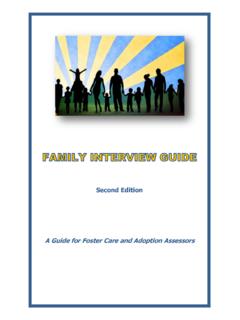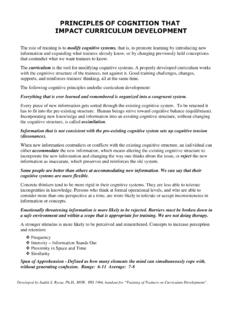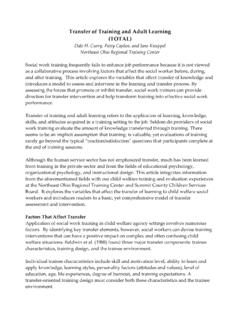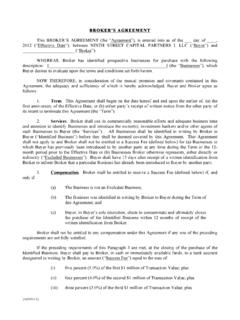Transcription of Protecting Parents' Constitutional Rights During …
1 Developed by the Institute for Human Services and the CAPTA Ad-Hoc Work Group for the Ohio Child Welfare Training Program and the Ohio Department of Job and Family Services April 2005, March 2008 Protecting parents Constitutional Rights During CHILD ABUSE AND NEGLECT INVESTIGATIONS AND ASSESSMENTS APRIL 28, 2005 REVISED 3-27-08 Prepared by: The Institute for Human Services In collaboration with The CAPTA Ad Hoc Work Group Prepared for: The Ohio Department of Job and Family Services and The Ohio Child Welfare Training Program Developed by the Institute for Human Services and the CAPTA Ad-Hoc Work Group for the Ohio Child Welfare Training Program and the Ohio Department of Job and Family Services April 2005, March 2008 This document was developed by the CAPTA Ad Hoc Work Group, comprised of the following people: Nan Beeler, MSW, LISW, Project Manager, Institute for Human Services Yvonne C.
2 Billingsley, JD, Assistant Prosecuting Attorney, Cuyahoga County Jerry Coleman, JD, agency attorney, Stark County Department of Job and Family Services LeRoy Crozier, Program Support and Training, Ohio Department of Job and Family Services Tammy Devine, Program Administrator of Intake and Investigations, Stark County Department of Job and Family Services Randi Lewis, JD, Deputy Legal Counsel, Office of Legal Services, Ohio Department of Job and Family Services Leslie McGee, Section Chief, Protective Services, Office for Children and Families, Ohio Department of Job and Family Services Christine Julian, JD, Franklin County Prosecutor s Office Bob McClaren, JD, agency attorney, Franklin County Children Services Kathryn Mercer, MSSA, PhD, JD, Professor, Case Western Reserve University Christina Rosebough-Schneider, JD, Juvenile Court Magistrate, Richland County Rich Schneider, JD, Assistant Prosecutor, Hamilton County Timothy Stolitca, Program Director, Intake Department, Hamilton County Department of Job and Family Services Dave Thomas, MSSA, LSW, Office for Children and Families.
3 Bureau of Family Services, Ohio Department of Job and Family Services Catherine Pomeroy Tucker, JD, agency attorney, Summit County Children Services Consulting on this document was Howard Davidson, JD, Director, American Bar Association Center on Children and the Law; the National Resource Center on Legal and Judicial Issues. Please note: During the revision of this paper, Ohio's Statewide Automated Child Welfare Information System (SACWIS) was implemented, which required PCSAs to utilize the Comprehensive Assessment and Planning Model - Interim Solution (CAPMIS). Some Ohio Administrative Code rules were revised to be consistent with CAPMIS.
4 In this paper the revised rule numbers are included in parentheses following the former rule number. For example, OAC 5101:2-33-04 (post SACWIS OAC 5101:2-33-20). Developed by the Institute for Human Services and the CAPTA Ad-Hoc Work Group for the Ohio Child Welfare Training Program and the Ohio Department of Job and Family Services April 2005, March 2008 Protecting parents ' Constitutional Rights During CHILD ABUSE AND NEGLECT INVESTIGATIONS AND ASSESSMENTS TABLE OF CONTENTS Introduction ..1 General Principles ..2 Issue #1: Notification of Individual Subject of Issue #2: Obtaining Consent from the Subject of the Issue #3: Children or Non-Parental Adults Consenting to a Caseworker Entering or Searching the Issue #4: Involving Law Enforcement During Issue #5: Conducting Interviews with Children Without Parental Knowledge or Against Parental Issue #6: Interviewing Collateral Sources Without the Subject s Resources for obtaining collateral information.
5 27 Developed by the Institute for Human Services and the CAPTA Ad-Hoc Work Group for the Ohio Child Welfare Training Program and the Ohio Department of Job and Family Services April 2005, March 2008 1 Protecting parents ' Constitutional Rights During CHILD ABUSE AND NEGLECT INVESTIGATIONS AND ASSESSMENTS INTRODUCTION The United States Congress amended the Child Abuse Prevention and Treatment Act (CAPTA) in 2003. Among the major additions or revisions to CAPTA, the new law requires: At the initial time of contact with the individual subject to a child abuse and neglect investigation, the public children services agency (PCSA) worker must advise the individual of the complaints or allegations made against him/her in a manner Protecting the Rights of the reporter.
6 And Public Children Services Agency (PSCA) workers must be trained regarding their legal duties in order to protect the legal Rights and safety of children and families from the initial time of contact During the investigation through treatment. This document provides guidelines to address commonly asked questions and dilemmas regarding these two CAPTA provisions. A statewide work group of child welfare staff professionals developed this guidance document. The work group consisted of PCSA staff, PCSA agency attorneys and prosecuting attorneys, Ohio Department of Job and Family Services (ODJFS) legal and child protective services staff, staff from the Institute for Human Services (the State Coordinator of the Ohio Child Welfare Training Program), PCSA administrators a juvenile court administrator, and a law professor.
7 This group considered best practice standards, available Ohio Revised Code (ORC) and Ohio Administrative Code (OAC), and the dilemmas faced by PCSAs. In June 2004, the ODJFS revised the OAC to address the two CAPTA requirements mentioned above. However, additional guidance has proven necessary to address many practice issues facing PCSA workers who conduct child abuse and neglect investigations and the training requirements concerning their legal duties. Statute, rule, or consistent case law may not currently exist on specific issues involved in conducting children services investigations.
8 Therefore, these guidelines may be refined over time as issues are addressed by Ohio or federal statutes, ODJFS, or clarifying case law. Developed by the Institute for Human Services and the CAPTA Ad-Hoc Work Group for the Ohio Child Welfare Training Program and the Ohio Department of Job and Family Services April 2005, March 2008 2 These guidelines are intended to help PCSA staff work with families to protect children from maltreatment, while at the same time Protecting parents Constitutional Rights . Some of the content of this document is in response to the CAPTA requirements and/or state statute; some reflects best practice standards that are not reflected in statute.
9 Each PCSA will need to collaborate with its prosecutor and/or agency attorney to implement these guidelines in its agency. PCSAs will need to consider their own internal operations, how the Juvenile Court operates, and how jurists are likely to interpret legal concepts that affect the implementation of CAPTA. Please note: This paper is limited to discussion of parent's Rights related to due process, notification, consent to search and seizure and right to privacy as they relate to caseworkers' investigations of child abuse and neglect. It was written after careful study of current case law on these subjects.
10 As new case law emerges, and as new legal direction becomes available, guidance regarding these issues will be updated. GENERAL PRINCIPLES parents have a fundamental liberty interest in raising their children free of government interference. This principle of Constitutional law has also been referred to as a right of family integrity or a right of privacy. parents also have a right to be secure from unreasonable search and seizures and to receive the protections of due process of law established in the Fourth and Fourteenth Amendments to the Constitution.
















